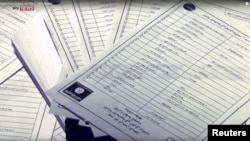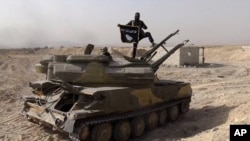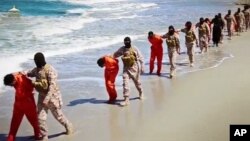Nagging doubts are tempering expectations that a purported trove of data files stolen from Islamic State will help unmask the terror group's foreign fighter network and perhaps lead to a crippling blow against the self-declared caliphate.
Counterterrorism experts in the United States, Britain, Germany and other countries are studying the tens of thousands of files obtained by Britain's Sky News from someone it described as an Islamic State defector.
The former IS fighter claimed he stole a memory stick from the head of the terror organization's internal security wing. The files are believed to hold information about more than 22,000 of the group's members, recruits and sympathizers.
Reports from Britain, Germany and Syria said the files contained information about jihadists from 51 countries, including 23 questions that Islamic State recruits must answer before they can be accepted as members of the extremist organization.
"We believe there is a high probability that these documents are genuine," a spokesman for Germany's Federal Criminal Police told the Associated Press.
Mixed with forgeries
But some Western intelligence officials and analysts contacted by VOA have raised concerns about the files, suggesting that genuine IS information may be mixed with forged documents in order to drive up their sale price.
A Western intelligence official who has seen the documents told VOA that these officials and analysts think the files don’t provide full details on 22,000 fighters, as widely reported, but only on 1,736 fighters. Most of the fighters identified come from 40 countries; a quarter are Saudis and the rest mainly Tunisian, Moroccan and Egyptian.
Only a small proportion, the source said, are from the West — four are Americans and a half dozen are from Canada. European recruits listed are from France, Germany and Britain. The British names were all previously known, and the identified fighters crossed into Syria from Turkey in November and December 2013.
There also are concerns that the files have been shopped around for more than a year, in what may be part of a growing attempt to meet a demand for information on IS.
In recent weeks, vendors have been offering for sale in southern Turkey, especially in the border towns of Gaziantep and Urfa, IS documents and thumb drives.
Sky News also is not the only media company saying it bought the material. NBC News said it had made a similar purchase.
Western television companies have been competing hard to make purchases, prompting both an ethics debate within the press corps covering Islamic State and the Syrian conflict and triggering anxiety about the ease with which false documents can secure buyers.
Charlie Winter, a researcher at Georgia State University who specializes on IS, told VOA he was “not very” comfortable with the leaked documents.
“I think the data is real, but the way it's presented makes me very suspicious,” he said.
Stylistic inconsistencies
Other concerns revolve around stylistic inconsistencies, including terms used and the logo that has been stamped on some of the documents, one not used before.
Syrian opposition news site Zaman al-Wasl said that in its review of the documents, it found thousands of repetitions in the leaked material. The site noted that files documenting the deaths of militants used the phrase "date of killing" rather than the more common IS bureaucratic term “martyrdom.”
“It’s possible there will be inauthentic documents mixed in,” said Daveed Gartenstein-Ross, a senior fellow at the Foundation for Defense of Democracies. “It’s even possible the Islamic State will disseminate some fake documents to sow confusion.”
Still, Gartenstein-Ross believes the loss of so much data could be pivotal for IS, which has been coming under increased pressure on numerous fronts.
“It’s really ISIS’ OPM hack,” he said, referring to the 2015 data breach at the U.S. Office of Personnel Management that resulted in the disclosure of information on 21.5 million people, including some who had applied for government security clearances.
The payoff for the U.S. and its coalition allies may not be immediate. But Islamic State’s enemies, including countries like Iran, the regime of Syrian President Bashar al-Assad, and rival groups like Jabhat al-Nusra, will be pouring through the data to try to get a better understanding of Islamic State’s internal dynamics.
Those who have seen the stolen data say much of it consists of enrollment forms with the names of Islamic State recruits, their supporters, telephone numbers, addresses and other information, including their particular skills and personal references.
Evidence of 'fraying'
Regardless of whether all of the data files are legitimate, analysts and officials say they do lend more credence to the idea that Islamic State may be succumbing to increased pressure on multiple fronts.
“Even within Mosul, which they still do control, we’ve seen signs that they are fraying from within,” Pentagon spokesman Captain Jeff Davis told reporters Wednesday. "The success we’ve had with our airstrikes, with our oil strikes [raids on IS-held oil facilities], is causing them great difficulty in paying their own people.
"That is causing desertions. It is causing loss of morale. It is causing there to be cases of insubordination.”
Those who have seen the stolen data say much of it consists of enrollment forms with the names of Islamic State recruits, their supporters, telephone numbers, addresses and other information, including their particular skills and personal references.
Regardless of whether all of the data files are legitimate, analysts and officials say they do lend more credence to the idea that Islamic State may be succumbing to increased pressure on multiple fronts.
“Even within Mosul, which they still do control, we’ve seen signs that they are fraying from within,” Pentagon spokesman Captain Jeff Davis told reporters Wednesday. "The success we’ve had with our airstrikes, with our oil strikes [raids on IS-held oil facilities], is causing them great difficulty in paying their own people.
"That is causing desertions. It is causing loss of morale. It is causing there to be cases of insubordination.”
Katherine Gypson and Jeff Seldin reported from Washington. Jamie Dettmer reported from Greece.













